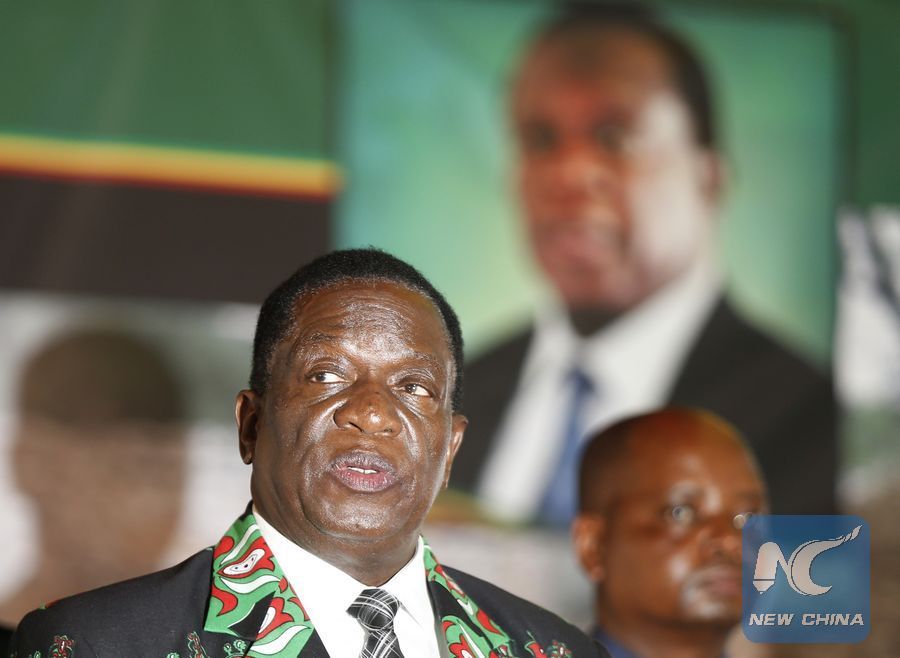
File photo shows Zimbabwean President Emmerson Mnangagwa makes opening remarks during an extra ordinary congress of the governing ZANU-PF party in Harare, Zimbabwe, Dec. 15, 2017. (Xinhua/Shaun Jusa)
by Tichaona Chifamba
HARARE, Dec. 24 (Xinhua) -- The military intervention on Nov. 15 has completely changed Zimbabwe's political landscape with the former President Robert Mugabe leaving the helm of both government and the ruling Zanu-PF party.
Having been the only leader Zimbabweans have ever known since the country attained independence from Britain in 1980, Mugabe had for 37 years commanded much respect from the military which exhibited.
In fact, the military in 2008 intervened in another way after Mugabe had suffered a presidential election stumble at the hands of long time rival Morgan Tsvangirai.
It allegedly forced people to vote for Mugabe in the run-off that Tsvangirai boycotted, citing violence perpetrated on his supporters.
However, as succession issues boiled over as party and government officials saw Mugabe edging towards the twilight of his political career, military seeming to take more interest in the emerging succession battle.
The then Vice President Emmerson Mnangagwa and Mugabe's wife Grace were seen as likely successors. Their contention grew fierce in recent years, with Grace spiritedly accusing Mnangagwa of trying to topple Mugabe.
On Nov. 6 Mugabe fired Mnangagwa, which led the military to take over of the government on the night of Nov. 14/15, culminating in Mugabe's resignation on Nov. 21.
Within Zanu-PF, Mugabe was also fired as party president and first secretary while his wife Grace and a few other top officials were expelled.
Zimbabwe Defense Forces commander Constantino Chiwenga said the forces had noted that there were purges within the party targeting people who had a history with the liberation struggle, while those who did not participate were gaining ground, which is interpreted as referring to Grace and her allies.
He said there had been no meaningful development in the country for the past five years due to squabbling in the ruling party.
"The resultant economic impasse has ushered in more challenges to the Zimbabwean populace such as cash shortages and rising commodity prices," he said a day before the military action.
The bloodless action, and its public support, have led the regional body Southern African Development Community to accept the new political dispensation in the country.
NEW PRESIDENT, MIXED REACTIONS
Despite the public support for a change of leadership, Mnangagwa's ascendency to the leadership however was met with mixed feelings.
Many have hoped he can turn around the fortunes of the economy despite the fact that he was not their preferred choice for leader.
"Let's give him a chance. He has less than eight months of Mugabe's term left and let's see how he will fare. Things will not change overnight but his policies will assure us whether we are moving in the right direction or not," said informal trader Petros Hove.
So far, he has preached about forgiveness, calling for people to rebuild the country as one regardless of party affiliation.
But his critics still allege that his ascendency was not constitutional as he literally toppled an elected leader with assistance from the military.
Chiwenga, who led the military intervention, retired recently with Mnangagwa saying that he is due for reassignment.
Speculation is high that he will be appointed one of two vice presidents, while two other generals have already been appointed to cabinet positions and another re-assigned to the party's commissariat department.
OVERWHELMING CHALLENGES
One major task facing Mnangagwa is ending the prevailing cash shortages amid the country's struggling economy.
Zimbabweans have endured cash shortages for more than three years and the introduction of bond notes in 2016 to plug the crisis has not eased their woes.
The country's economy also remains under stress mainly due to low domestic production across all sectors. It recorded the lowest growth rate since 2009 of 0.6 percent in 2016, when it had started to grow following years of recession. The 2017 forecast is 2.8 percent, according to the IMF.
Many reasons for the liquidity challenges have been proffered, among them few exports and externalization of the U.S. dollar.
Unsustainable current account and capital account deficits have also put pressure on the nostro accounts of banking institutions, resulting in cash shortages.
Long queues still characterize many banks especially at month-ends when people get their salaries, but some people have stopped visiting banks amid prevailing lack of confidence in the banking sector.
Some banks continued to give clients less than 50 dollars a day while others pegged their limits at 100 dollars once a week.
So far, hopes that Mnangagwa can reverse the trend have remained high. The business community has expressed confidence in the future.
Foreign direct investment is now expected to flow into the country following drastic changes to the indigenization law that previously required foreigners to own up to 49 percent of local companies.
The new law will limit the 49/51 percent threshold to the natural resources sector, particularly diamond and platinum mining.
Zimbabweans are yet to see tangible results from the change of leadership but the signs of changes have kept many upbeat about the country's future.
?

